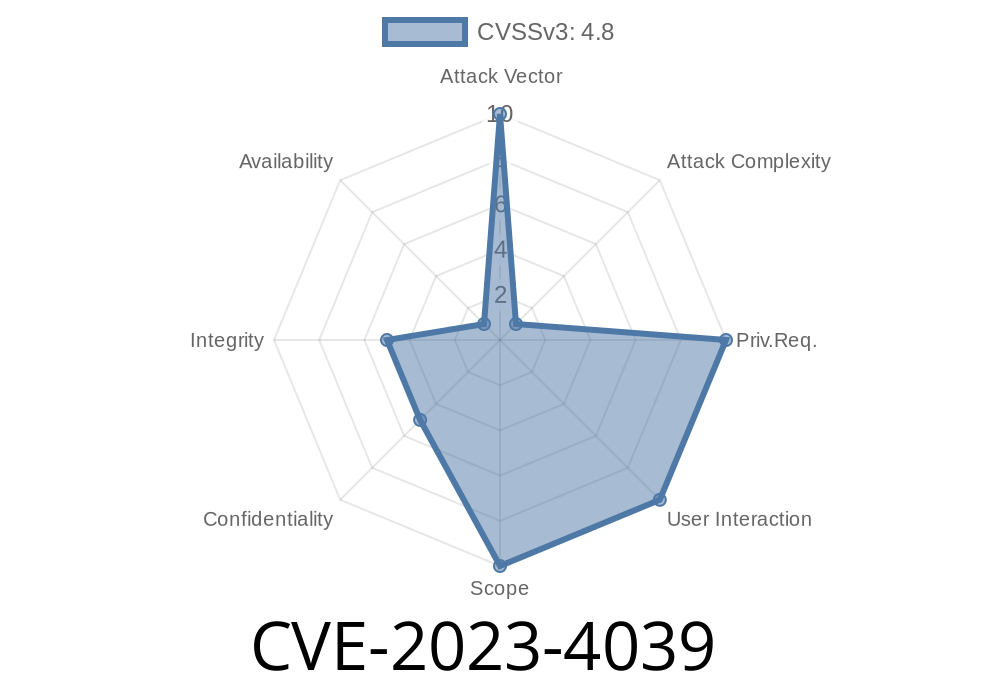CVE-2023-4039 is a significant security vulnerability affecting AArch64 (64-bit ARM) applications built with GCC-based toolchains. More specifically, this affects applications that use dynamically-sized local variables. In this post, we’ll break down what the vulnerability is, how it works, who is at risk, how attackers can exploit it, and what you can do about it — all in plain English.
What Is the Stack Protector?
The stack protector (-fstack-protector in GCC) is a security feature built into modern compilers. Its main job is to help detect buffer overflows on the stack. When enabled, it places a canary value between local variables and the control data (like the return address). If a buffer overflow corrupts this canary, the program will terminate before an attacker can hijack the program's control flow.
In short: Canary is like a guard standing between your valuables and a potential thief.
What’s the Problem in CVE-2023-4039?
This vulnerability shows that for AArch64 programs compiled with GCC, the stack canary does not properly protect:
- Dynamically-sized local variables (like C99-style Variable Length Arrays)
Memory allocated via alloca()
However, it does work for *regular, fixed-size* local variables.
This means: If your code relies on stack protector to catch overflows on dynamic buffers, your application is wide open to attack—even if you think it’s protected.
Technical Details: The Flaw in the Stack Protector
The core problem: GCC does not insert a canary check between the return address and dynamically-sized local variables in AArch64 builds.
This happens because GCC places the canary in a fixed position relative to the stack frame, but dynamically-sized variables can move things around in unexpected ways. As a result, an overflow on such a buffer can pass right over the canary, or may not affect it at all.
Here’s a simplified C code snippet, affected by this issue
#include <stdio.h>
#include <stdlib.h>
void process_input(size_t len) {
char buffer[len]; // C99 VLAs; dynamically sized local variable
// Simulate a vulnerable buffer overflow
for (size_t i = ; i < len + 10; i++) {
buffer[i] = 'A'; // This can overwrite past the buffer!
}
printf("Processing done.\n");
}
int main(int argc, char* argv[]) {
size_t input_len = (argc > 1) ? atoi(argv[1]) : 40;
process_input(input_len);
return ;
}
If compiled for x86_64 with stack protection, the overflow is usually caught and the program aborts.
- On AArch64 with vulnerable GCC versions, the overflow won’t be detected, and control data such as the return address may be overwritten—allowing further exploitation.
Here’s an alloca() example that is also vulnerable
#include <stdio.h>
#include <stdlib.h>
#include <alloca.h>
void process_input(size_t len) {
char *buffer = (char *)alloca(len);
// Dangerous overflow
for (size_t i = ; i < len + 10; i++) {
buffer[i] = 'B';
}
printf("Processed with alloca.\n");
}
How Can Attackers Exploit CVE-2023-4039?
An attacker who already can overflow a buffer will typically trigger the stack protector, causing a crash (Denial of Service) but not allowing further attacks. But, because of CVE-2023-4039, if you use a Variable Length Array or alloca() to manage buffers, the canary check is unreliable:
Who Is Affected?
- Any AArch64 program built with vulnerable versions of GCC (versions before the fix)
1. Upgrade GCC
- Check if your GCC version includes the fix for GCC bug #111302.
References and Further Reading
- CVE-2023-4039 - MITRE
- GCC Bugzilla: 111302 - stack-protector missing for alloca/VLAs on AArch64
- GCC stack-protector documentation
- Red Hat Security Advisory
- alloca() - Linux manual
- Stack Protector Design (Wikipedia)
Conclusion
CVE-2023-4039 is a textbook example of how even well-known security features can fail in subtle ways. If you’re building C programs for AArch64 with GCC, you must ensure your toolchain is updated and audit how you use dynamic local variables. Stack protectors are great—but only if they’re watching the right door.
Stay patched, stay safe!
*This article is original and exclusive. For updates and more security advisories, see the official references linked above.*
Timeline
Published on: 09/13/2023 09:15:00 UTC
Last modified on: 09/14/2023 20:01:00 UTC
